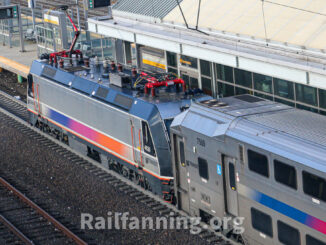NEWARK, N.J. – Plans to eliminate a major chokepoint and source of delays on the Northeast Corridor are underway thanks to action taken this week by the N.J. Transit Board of Directors to conduct environmental and related engineering work to rehabilitate or expand the 96-year-old Amtrak Portal Bridge.
The Board awarded a $3.3 million contract to New York-based AKRF Inc. to determine how best to increase rail capacity at the two-track swing bridge, which carries the Northeast Corridor (NEC) over the Hackensack River just west of Secaucus Junction.
“Today’s action is another example of this Board’s commitment to take meaningful steps to increase capacity, improve reliability and reduce delays for our customers,” said Transportation Commissioner and N.J. Transit Chairman Kris Kolluri. “Addressing Portal Bridge will improve the commute for people who travel daily to Newark and New York.”
N.J. Transit will lead the project in a formal partnership with the Federal Railroad Administration, the Federal Transit Administration and Amtrak.
“Enhancing our ability to move more trains over the Portal Bridge is especially important and will advance on a parallel track with the Trans-Hudson Express (THE) Tunnel project,” said N.J. Transit Executive Director George D. Warrington. “In order to realize the full potential of THE Tunnel, we must also address the other major chokepoint on the Northeast Corridor: Portal Bridge.”
AKRF will prepare a Draft Environmental Impact Statement that examines several options for providing additional track capacity and improved reliability over the Hackensack River – including the possibility of replacing Portal Bridge with a new span to support up to twice as many trains – and determine the requirements for additional track capacity on the Northeast Corridor west of the bridge.
In addition, the DEIS will consider elevating the span to reduce the number of openings for marine traffic and to reduce resulting train delays. Last month, a malfunction with the mechanism that locks Portal Bridge in place for train crossings resulted in the cancellation of 22 peak-period trains, demonstrating both the importance of the bridge and the need to improve its reliability.
Under the contract, AKRF Inc., which has a regional office in Marlton, NJ, will create concept plans and designs, assess environmental impacts, make capital and operating cost estimates and conduct public hearings.
It is anticipated that the DEIS will be completed by late 2007, followed by design and construction. The project should be completed for the opening of THE Tunnel in 2016.




